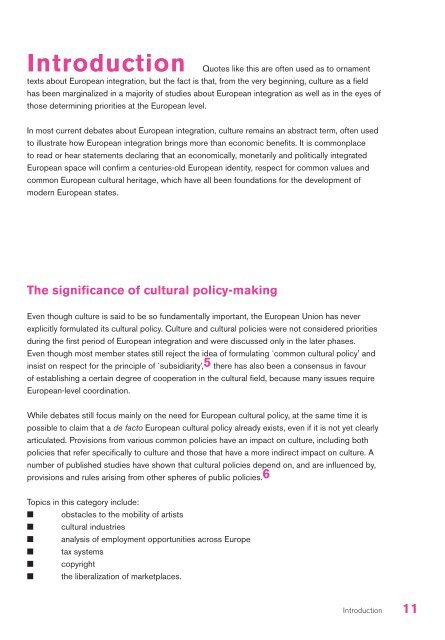Why we need European cultural policies: the impact of EU ...
Why we need European cultural policies: the impact of EU ...
Why we need European cultural policies: the impact of EU ...
You also want an ePaper? Increase the reach of your titles
YUMPU automatically turns print PDFs into web optimized ePapers that Google loves.
Introduction Quotes like this are <strong>of</strong>ten used as to ornamenttexts about <strong>European</strong> integration, but <strong>the</strong> fact is that, from <strong>the</strong> very beginning, culture as a fieldhas been marginalized in a majority <strong>of</strong> studies about <strong>European</strong> integration as <strong>we</strong>ll as in <strong>the</strong> eyes <strong>of</strong>those determining priorities at <strong>the</strong> <strong>European</strong> level.In most current debates about <strong>European</strong> integration, culture remains an abstract term, <strong>of</strong>ten usedto illustrate how <strong>European</strong> integration brings more than economic benefits. It is commonplaceto read or hear statements declaring that an economically, monetarily and politically integrated<strong>European</strong> space will confirm a centuries-old <strong>European</strong> identity, respect for common values andcommon <strong>European</strong> <strong>cultural</strong> heritage, which have all been foundations for <strong>the</strong> development <strong>of</strong>modern <strong>European</strong> states.The significance <strong>of</strong> <strong>cultural</strong> policy-makingEven though culture is said to be so fundamentally important, <strong>the</strong> <strong>European</strong> Union has neverexplicitly formulated its <strong>cultural</strong> policy. Culture and <strong>cultural</strong> <strong>policies</strong> <strong>we</strong>re not considered prioritiesduring <strong>the</strong> first period <strong>of</strong> <strong>European</strong> integration and <strong>we</strong>re discussed only in <strong>the</strong> later phases.Even though most member states still reject <strong>the</strong> idea <strong>of</strong> formulating `common <strong>cultural</strong> policy’ andinsist on respect for <strong>the</strong> principle <strong>of</strong> `subsidiarity’,5 <strong>the</strong>re has also been a consensus in favour<strong>of</strong> establishing a certain degree <strong>of</strong> cooperation in <strong>the</strong> <strong>cultural</strong> field, because many issues require<strong>European</strong>-level coordination.While debates still focus mainly on <strong>the</strong> <strong>need</strong> for <strong>European</strong> <strong>cultural</strong> policy, at <strong>the</strong> same time it ispossible to claim that a de facto <strong>European</strong> <strong>cultural</strong> policy already exists, even if it is not yet clearlyarticulated. Provisions from various common <strong>policies</strong> have an <strong>impact</strong> on culture, including both<strong>policies</strong> that refer specifically to culture and those that have a more indirect <strong>impact</strong> on culture. Anumber <strong>of</strong> published studies have shown that <strong>cultural</strong> <strong>policies</strong> depend on, and are influenced by,provisions and rules arising from o<strong>the</strong>r spheres <strong>of</strong> public <strong>policies</strong>.6Topics in this category include:■ obstacles to <strong>the</strong> mobility <strong>of</strong> artists■ <strong>cultural</strong> industries■ analysis <strong>of</strong> employment opportunities across Europe■ tax systems■ copyright■ <strong>the</strong> liberalization <strong>of</strong> marketplaces.Introduction11














